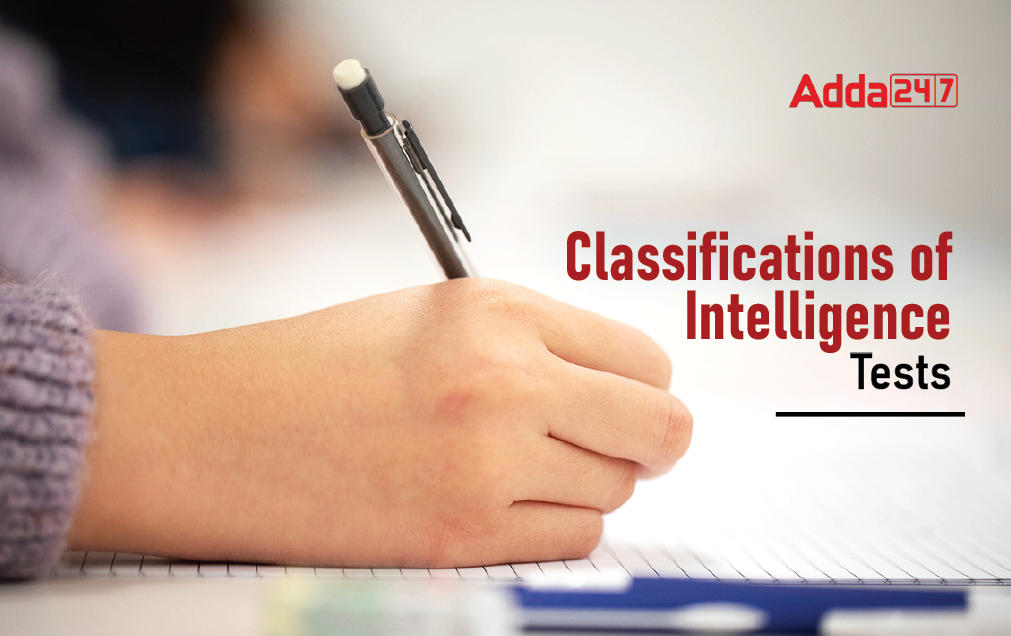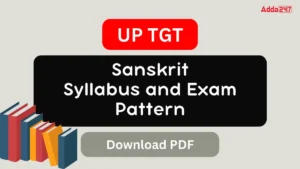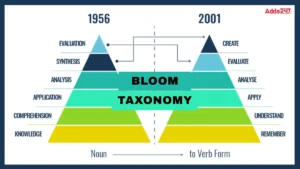Table of Contents
Intelligence is a cognitive process that applies one’s knowledge to a noble situation or adjustment. Intelligence Tests can be classified as either verbal or performance tests based on the nature of the items used. In the “Child Development & Pedagogy” section, Intelligence Tests are important topics that contain scores of 3-4 mark. Intelligence test topics contain definitions and differences of tests. This topic is very important for every CTET and recruitment Exam. Here we are going to learn in detail the Classifications of intelligence tests / बुद्धि परीक्षणों का वर्गीकरण
Classifications of Intelligence Tests / बुद्धि परीक्षणों का वर्गीकरण
Intelligence tests are very helpful as well as useful to observe an individual’s intelligence level or IQ. Intelligence tests are designed according to the number of candidates. Thus, they are divided into two major sub-categories i.e. ‘individual tests’ and ‘group tests’. The individual test is applied to a single subject at the same time. On the other hand, group tests are applied to a group of people at the same time. Both these major categories are further divided into two sub-categories 1.e. ‘verbal tests’ and ‘non-verbal tests’.
किसी व्यक्ति के बुद्धि स्तर या बुद्धि का निरीक्षण करने के लिए उपयोगी होने के साथ-साथ बुद्धि परीक्षण बहुत उपयोगी होते हैं। बुद्धि परीक्षण उम्मीदवार की संख्या के अनुसार डिजाइन किए गए हैं। इस प्रकार, उन्हें दो प्रमुख उप-श्रेणियों में विभाजित किया जाता है अर्थात् व्यक्तिगत परीक्षण और समूह परीक्षण। एक ही समय में एक ही विषय पर व्यक्तिगत परीक्षा लागू की जाती है। दूसरी ओर, समूह परीक्षण एक ही समय में लोगों के समूह पर लागू होते हैं। इन दोनों प्रमुख श्रेणियों को आगे दो उप-श्रेणियों यानी मौखिक परीक्षण और गैर-मौखिक परीक्षण में विभाजित किया गया है।
We can also understand the classification of intelligence tests with the help of following figure:
हम निम्नलिखित आंकड़ों की मदद से बुद्धि परीक्षणों के वर्गीकरण को भी समझ सकते हैं:
- Individual Tests: These refer to the tests that can be administered or performed on only one individual at a single point in time. व्यक्तिगत परीक्षण: ये उन परीक्षणों को संदर्भित करते हैं जिन्हें एक समय में केवल एक ही व्यक्ति पर प्रशासित या निष्पादित किया जा सकता है।
- Group Tests: These refer to the tests that can be administered or performed on a group of individuals together at a single point in time.समूह परीक्षण: ये उन परीक्षणों को संदर्भित करते हैं जिन्हें एक ही समय में एक साथ व्यक्तियों के समूह पर प्रशासित या निष्पादित किया जा सकता है
- Verbal Tests: These tests refer to the tests that are performed using language. In other words, language (either the verbal or written form or both) is used to measure intelligence. In such tests, people are asked to solve some problems with the help of a language. मौखिक परीक्षण: ये परीक्षण उन परीक्षणों को संदर्भित करते हैं जो भाषा का उपयोग करके किए जाते हैं। दूसरे शब्दों में, भाषा (या तो मौखिक या लिखित रूप या दोनों) का उपयोग बुद्धि को मापने के लिए किया जाता है। ऐसे परीक्षणों में, लोगों को भाषा की मदद से कुछ समस्याओं को हल करने के लिए कहा जाता है।
- Non-Verbal Tests: These tests refer to the tests in which a language is not used. This is especially helpful for those who are illiterate or do not have an understanding of language. Thus, it is based more on gestures, directions, Images and intangible objects. Performance tests are an example of such tests. गैर-मौखिक परीक्षण: ये परीक्षण उन परीक्षणों को संदर्भित करते हैं जिनमें किसी भाषा का उपयोग नहीं किया जाता है। यह उन लोगों के लिए विशेष रूप से सहायक है जो अनपढ़ हैं या जिन्हें भाषा की समझ नहीं है। इस प्रकार, यह इशारों, दिशाओं, छवियों और अमूर्त वस्तुओं पर आधारित है। प्रदर्शन परीक्षण ऐसे परीक्षणों का एक उदाहरण है।
Difference between Individual and Group Intelligence Tests/ व्यक्तिगत और समूह बुद्धि परीक्षणों के बीच अंतर
The following table lists various differences between individual and group intelligence tests/ निम्न तालिका व्यक्तिगत और समूह बुद्धि परीक्षणों के बीच विभिन्न अंतरों को सूचीबद्ध करती है:
| S. No. | Individual intelligence tests/ व्यक्तिगत परीक्षण | Group intelligence tests/ समूह बुद्धि |
| 1. | These tests can be performed on only one individual at a time. ये परीक्षण एक समय में केवल एक ही व्यक्ति पर सीधा-सरल हो सकते हैं। | These tests can be performed on a group of individuals at a same time. ये परीक्षण एक ही समय में व्यक्तियों के समूह पर किए जा सकते हैं। |
| 2. | These are very specific. ये बहुत विशिष्ट हैं। | These are not so specific. ये इतने विशिष्ट नहीं हैं। |
| 3. | These are stress based. ये तनाव आधारित हैं। | These are relaxed and stress free. ये तनावमुक्त और तनाव मुक्त होते हैं। |
| 4. | There is limited time available. सीमित समय उपलब्ध है। | There is no restriction of time. समय का कोई बंधन नहीं है। |
| 5. | These do not include too many questions. इनमें बहुत सारे प्रश्न शामिल नहीं हैं। | These include a wide range of questions. इनमें प्रश्नों की एक विस्तृत श्रृंखला शामिल है। |
| 6. | These are expensive. ये महंगे हैं। | These are not so expensive. ये इतने महंगे नहीं हैं। |
| 7. | These cannot be performed on groups. इन समूहों पर प्रदर्शन नहीं किया जा सकता है। | These cannot be performed on an individual or individuals separately. इन्हें अलग-अलग या व्यक्तियों पर नहीं किया जा सकता है। |
| 8. | These tests need experts or trained psychologists to be conducted. इन परीक्षणों के लिए विशेषज्ञों या प्रशिक्षित मनोवैज्ञानिकों की आवश्यकता होती है। | These tests do not need experts or trained psychologists to be conducted. इन परीक्षणों को आयोजित करने के लिए विशेषज्ञों या प्रशिक्षित मनोवैज्ञानिकों की आवश्यकता नहीं है। |
Difference between Verbal and Non-Verbal Intelligence Tests/मौखिक और गैर-मौखिक बुद्धि परीक्षणों के बीच अंतर
The following table lists various differences between verbal and nonverbal intelligence tests.They are as follows/ निम्न तालिका मौखिक और अशाब्दिक बुद्धि परीक्षणों के बीच विभिन्न अंतरों को सूचीबद्ध करती है। वे इस प्रकार हैं
| S. No. | Verbal Intelligence Tests/ मौखिक परीक्षण | Non- Verbal Intelligence Tests/ गैर-मौखिक परीक्षण |
| 1. | These tests include language or words. इन परीक्षणों में भाषा या शब्द शामिल हैं। | These tests include images, directions and abstract objects. इन परीक्षणों में चित्र, दिशाएं और अमूर्त वस्तुएं शामिल हैं। |
| 2. | These tests cannot be performed on illiterates. ये परीक्षण निरक्षरों पर नहीं किए जा सकते हैं। | These tests can be administered on deaf, dumb blind and even on illiterates. ये परीक्षण बहरे, गूंगे अंधे और यहां तक कि निरक्षरों पर भी किए जा सकते हैं। |
| 3. | These tests are more reliable. ये परीक्षण अधिक विश्वसनीय हैं। | These tests are not reliable. ये परीक्षण विश्वसनीय नहीं हैं। |
| 4. | These tests are not meant for slow learners. ये परीक्षण धीमी गति से सीखने वालों के लिए नहीं हैं। | These tests are for all individuals. ये परीक्षण सभी व्यक्तियों के लिए हैं। |
| 5. | These tests do not have a wide coverage. इन परीक्षणों में व्यापक कवरेज नहीं है। | These tests have a wide coverage. इन परीक्षणों में एक विस्तृत कवरेज है। |
| 6. | These tests cannot be performed on small children. ये परीक्षण छोटे बच्चों पर नहीं किए जा सकते हैं। | These tests can be administered on even small children. ये परीक्षण छोटे बच्चों पर भी किए जा सकते हैं। |
Download Intelligence Test PDF




 UP TGT Sanskrit Syllabus and Exam Patter...
UP TGT Sanskrit Syllabus and Exam Patter...
 UGC NET Study Notes for Paper 1, Downloa...
UGC NET Study Notes for Paper 1, Downloa...
 Bloom Taxonomy, Purpose, Domains, Exampl...
Bloom Taxonomy, Purpose, Domains, Exampl...




